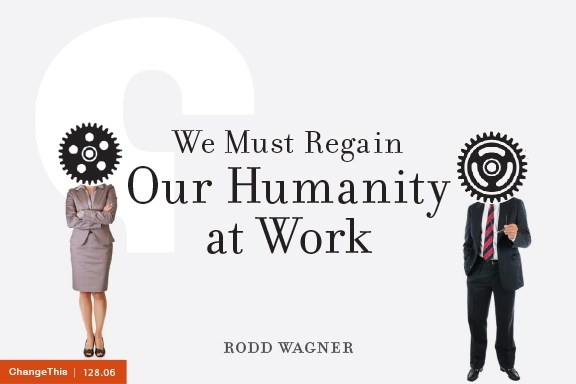ChangeThis RSS
"We hear the stories. Cornered by a passionate friend, we are regaled with tales of binge-watching House of Cards on Netflix, or the virtues of the Paleo diet combined with Crossfit, or a new recipes and decorating tips found on Pinterst. Certain organizations are winning the hearts and voices of their customers, and building the kind of loyalty that traditionally was reserved for family, community, and church. The secret that these organizations know is that people are craving membership. Organizations that build their businesses around people's need to belong, to be connected, and to be admired, organizations that are focused on relationships over products, are winning in today's economy."
Continue reading
"We've lost much of our humanity at work.
No one saw it coming. No one intended it.
It arrived in big changes to the economy, but also in small changes to the law, to technology, or to company policy, often with immediate benefits that masked their larger implications. The pension will be phased out in favor of a 401(k) match. The company will help pay for the latest digital device, so much the better to stay in touch with the office. One day a new electronic screening system helps HR take a first pass at incoming applications, and before long the software does most of the sifting. A modest change in workload leads to working through one weekend, which leads to another, which leads, before too long, to having a hard time remembering when one last took a weekend entirely uninterrupted by work.
Having allowed these slight modifications to accumulate over a decade or so, we now find ourselves treating people much more like cogs in the machine, like widgets. We've lost much of the human touch for what we now call our 'human resources.' Whether a company gets it back will largely determine its future."
Continue reading
"Curiosity is an incredible tool. But what I realized, what really inspired my desire to write A Curious Mind with Charles Fishman, is that most people don't use their curiosity with a sense of purpose and understanding—with insight about curiosity itself.
Curiosity is the key to understanding people's personalities and motivations.
Curiosity is a vital storytelling tool—and storytelling is the best way to engage and persuade other people, in your work life and your personal life.
Curiosity is a fantastic source of courage.
Curiosity is the best, most under-used management tool—a great way to create engagement in your fellow works, but also a great way to transmit values and priorities.
Curiosity is the spark for creativity and innovation, the best long-term investment you can make.
Curiosity is the best way to stay connected to those who are most important to you.
Curiosity, in fact, turns out to be a quiet superpower that all of us have. You don't need an Ivy League education to use it, you don't need a high-speed Internet connection.
What's curiosity done for you lately? We're betting it hasn't done enough."
Continue reading
"Ask any manager on planet Earth, 'What is your key challenge?' and among many different responses one will strike you with remarkable consistency: Staying afloat. The fast-moving roller-coaster economy we live in today makes this task increasingly difficult. Just as we handle one crisis, another looms around the corner. How can we sustain—and even thrive?
The answer is the one you've heard before: We must consistently remake who we are, what we offer, and how we deliver our offerings to the world. Put it simply, we must reinvent.
What you may not have heard before is this: Today, the frequency with which our reinvention must take place is staggering. Essentially, we must become a new company every three years.
In fact, we must reinvent so frequently and so radically that the traditional roles and processes inside of an organization cannot keep up. It's time to make reinvention into its own profession. The Ten Commandments are here to help you with this task. Spoiler alert: all hail the Chief Reinvention Officer!"
Continue reading
"Ask yourself: why is it so few organizations ever achieve performance even remotely close to their potential, much less that of their aspirations? Why is it so few organizations succeed through their second or third generation of leadership? Why are so few workplaces truly "great places to work"?
Is it because their leaders are stupid, their people incompetent, or their strategies inept? Did all those executives running formerly dominant companies such as Blackberry, Nokia, RadioShack or Kodak never get the memo about The Innovator's Dilemma? Is it simply not possible for most organizations to do fundamentally better? Or is all this just a matter of bad luck or fate, or the natural consequence of business Darwinism?
We don't think so. A big part of the answer is that most organizations and the executives who run them don't recognize, respect or leverage the reality and potential of the one resource every organization and management team create every day: failure—the other 'F' word."
Continue reading











